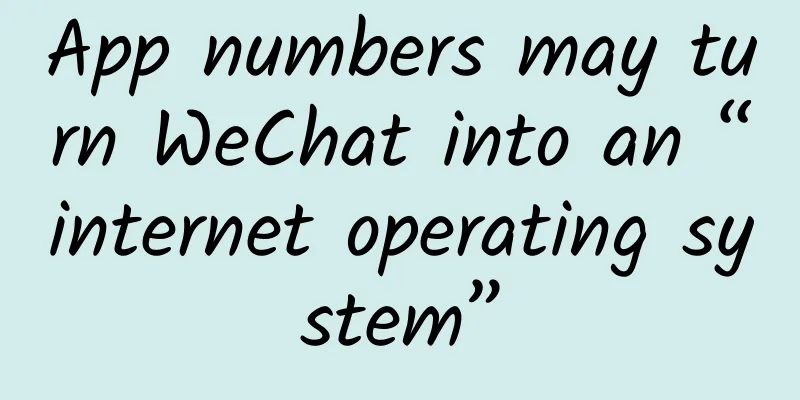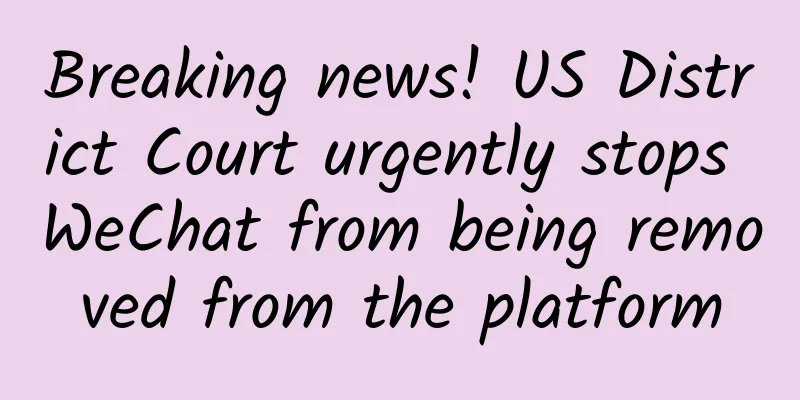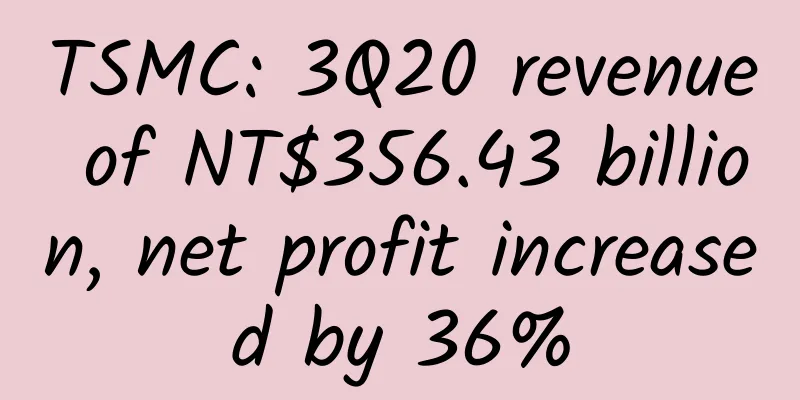App numbers may turn WeChat into an “internet operating system”

|
Recently, many entrepreneurs who want to enter the O2O market have consulted me about the choice between "App" and "Service Account". Recently, Zhang Xiaolong seemed to have provided a third solution in the WeChat Open Class - WeChat Application Account. So what is this WeChat Application Account? As a company, what is the best choice for expanding online services at present? Service Account vs App Let’s put aside the “application number” that is still shrouded in mystery for the moment. For now, companies are evenly split in their use of WeChat service accounts and APPs, and they need to make their choice based on local conditions. The main competitive advantages of service accounts: low development cost, short cycle, seamless update, and easy promotion 1. Compared with APP, the development cost and development cycle of service accounts are much lower. Since the WeChat backend has packaged the basic functions of the service account into an intuitive and directly pluggable interface, companies only need to let the WeChat operation team learn for a few hours to design and develop the service account. In addition, the industry chain of customized service account development in the market has also become increasingly mature, and some of them have already reached the scale of listing. For some common functions that are not supported by the WeChat backend (such as lucky draws, etc.), cheap or even free H5 templates that can be directly assembled and called can be found on the service homepages of these service account development companies. In contrast, if an enterprise intends to develop an APP to achieve the same function, the development cost will easily reach hundreds of thousands, whether it is self-operated or outsourced, and the time period can range from 2-3 months to half a year. 2. At the same time, the ultra-short development cycle of WeChat service accounts also brings an additional advantage, that is, service accounts can be updated seamlessly. Since the "programming" of service accounts is mostly constructed through the "plug and play" model of components, when the operator wants to modify a function in the official account or add a new service, it can be directly "previewed and released" without stopping the online service. For the update of network-based apps, even if it is just a minor adjustment, the operator must first shut down the server, upload the new version of the software, and then wait for users to download it. The time cost and user loss risk required are obviously much higher than the service account model. 3. In addition to the cost and efficiency of the service provision itself, the service account has another most important advantage, which is the promotion and publicity advantage that the WeChat platform brings to the service account. For many companies, the expansion of business opportunities is an eternal pain point. Service accounts are built on social media and are naturally endowed with excellent channel attributes and communication resources. The content uploaded to the service account can be directly socially disseminated in the circle of friends, and WeChat users attracted by the content can also directly become users of the service account through the "one-click follow" method. This kind of huge promotion advantage directly targets the pain points of many companies and is incomparable to the closed ecology of general apps. On the network-like social media, every user is a dissemination node, and the service account directly connects the enterprise to the entire dissemination system to achieve value-added scale. However, there are still many companies that prefer to use APPs rather than service accounts when providing online services. The main reasons are as follows: APP's main competitiveness: high degree of freedom, point-to-point interaction 1. The most obvious limitation of WeChat service accounts is the slightly lower degree of freedom in implementing functions. As we all know, the higher the degree of integration of functions, the lower the threshold for development; but at the same time, the types of functions that can be implemented will be more restricted. At present, the functional interfaces opened by WeChat are still very limited. If you want to achieve true "customized" development, you still have to rely on App to achieve it. 2. If an enterprise wants to proactively communicate and exchange with its online users in a more convenient way, developing an APP is undoubtedly its absolute first choice. Many operators who have used service accounts will find that the period in which an enterprise can push information to a user group is strictly limited, and it is completely impossible to conduct point-to-point communication or marketing promotion to an individual. This is not a "loophole" in WeChat's functions. The core logic behind it is that WeChat is still positioned as a social media, so the priority must be to maintain the user experience of its social users. In order to create a "clean" virtual social environment for users, for a considerable period of time, enterprises absolutely cannot hope that the WeChat team will relax restrictions on B2C information push. 3. The issue that most companies are most concerned about is the "monopoly" of user data by WeChat accounts. As long as a company uses a service account, all of its user data will be deposited on WeChat's remote server, which is equivalent to being strangled by Tencent at all times. On the one hand, the user information that WeChat opens to corporate users is limited to superficial data such as user nicknames, reading volume, and forwarding volume. Those user behavior data that can support user feature profiling and usage scenario analysis are hidden deep under the surface. Enterprises never know how much they can pay to buy user data from WeChat that should have been stored locally, and they have no chance to conduct in-depth data analysis. What makes most service account user enterprises even more terrified is that WeChat is currently in its development stage and many of its operating rules are still highly opaque. 4. “People live under the same roof”, and there is a risk of being completely blocked one day if there is a disagreement (such as the Uber blocking case some time ago). Today, when the value of data is increasingly valued, this risk of “annihilation” is obviously unacceptable to many companies, so they would rather spend more money to develop apps, but also ensure the independence and availability of their own data. App Numbers Turn WeChat into an “Internet Operating System” However, the launch of "App Number" may be the "singularity" of WeChat's evolution, which will break the current balance. Although there is not much detailed information about App Number, according to Zhang Xiaolong's recent speech at WeChat Open Class, we can still clearly grasp the positioning of App Number and the future development direction of WeChat platform. According to Zhang Xiaolong, WeChat was not originally intended to be a platform for disseminating content, but a platform that provides a wider range of services. The "application account" is the soil and platform for WeChat to develop a wider range of application services in the future, and it is also the promotion and extension of the current "service account" model. It can be imagined that as more and more service interfaces are opened, "cloud computing" technology becomes cheaper and more popular, the types of applications rooted in the WeChat platform will become more and more abundant, and the logic and functions of the services provided will become more and more complex. One day, when the types of services provided by the "application account" can compete with the current APP, WeChat will no longer be an SMS platform that competes with Momo, Mi Chat, and Fetion, but it is very likely to take a different evolutionary path and truly become a pan-channel platform that "connects everything". The author temporarily named this new product or business model as the Internet operating system. What is the “Internet operating system”? The core concept of the operating system is to build a bridge and interface between computers and users (including developers and end users), hardware and software. Although a typical operating system does not directly provide any functional services, any functional software must be supported by the operating system to run better. Developers can use the operating system to provide any possible services more efficiently, and users can also use the operating system's graphical interface to obtain services more conveniently. When WeChat was expanded into a pan-channel platform by the launch of "application numbers", its core product value and service logic are very similar to operating systems. Taking the WeChat platform as an example, as more and more commonly used functions are "cloudified" and packaged as application service interfaces that can be called remotely, more and more small and medium-sized companies and individual developers will be attracted to "hitch a ride" and provide application services to their potential customers through the "interface splicing mode" that is much more efficient than traditional programming methods. When the scale of application services reaches a critical value, the current core service of WeChat - SMS will become a secondary entry point for traffic. Its core business model will also be transformed into: building an open cloud platform to provide users with boundless services and value by aggregating the creativity, design and service capabilities of the entire industry chain. In this way, WeChat does not directly provide any services to users (except SMS) but can provide any possible services. It becomes the most dependent partner and service platform for enterprises, thus growing into a capability aggregator and value exchange node with a monopoly advantage in the entire mobile data network. Doesn’t this business model coincide with the basic concept of the operating system? Therefore, in my opinion, the essence of all platform-based business models is to create an "operating system" between the C-end and the B-end, which reduces the service costs and business opportunity acquisition capabilities of the B-end, while providing various possible services to the C-end; and it itself becomes the glue of the entire value chain and industrial chain. On this kind of "operating system" that spans tens of millions of terminals, many small and medium-sized enterprises and even individual producers will be connected to a value network with interconnected business opportunities, grab their own interests in a larger-scale efficient division of labor and provide more valuable services to the market. What is the core difference between Internet operating systems and traditional operating systems? Compared with traditional operating systems, Internet operating systems inherit their basic logic while evolving and improving them on multiple levels. 1. From static to dynamic. First, the services provided by the Internet operating system are no longer static service provision ports, that is, the so-called "A develops software, B purchases and uses the model", but have evolved into a dynamic demand docking channel and information transmission optimization platform. On such platforms, developers can dynamically connect with users to better grasp user needs. At the same time, real-time customized development and seamless updates of applications will also become a reality thanks to the "Internetization" of the platform. 2. The subjects expand from developers to operation managers. On the other hand, as a developer and operator of the Internet operating system, his role will also expand from software developer to manager and operator of this dynamic channel. The addition of this new role will also provide Internet operating system operators with a large number of potential capabilities and business opportunities, such as providing accurate user portrait analysis and publicity and promotion channels for application developers, and providing users with big data cloud services such as content and applications based on their preferences. The popularization of this kind of cutting-edge business model will further clarify the trend of data capitalization. Whoever controls the channel will have the best time and place to develop big data cloud services, because all B2C interactive information carried by the channel can be intercepted and controlled by Internet operating system operators under the current legal framework where data ownership is unclear, and ultimately transformed into the core competitiveness of its brand data services through "data mining and machine learning" technology. We have reason to predict that in the near future, channel services, operating system services and big data analysis services will be closely linked together due to structural advantages, and the "Internet operating system" will be the new service ecology formed by the powerful combination of the above three business formats. “Platforms” and “electric channels” want to develop into “systems” In fact, the evolution of WeChat platform into an Internet operating system is just a guess by the author. Whether it can eventually take off the current coat of SMS service provider and transform into an aggregator of industrial chain service capabilities is still unknown. But the author believes that for all "platforms" or "electric channels" positioned on smart terminals, their ultimate evolution direction must be an Internet operating system. Moreover, in addition to Tencent, other domestic Internet giants are also constantly testing and advancing in this direction (such as Alibaba YunOS, etc.). In essence, whether it is e-commerce, O2O or social media, the core value of all "platforms" or "channels" is the information connection between individuals, and ultimately the optimization of information connection drives the generation of the "value chain". This is completely consistent with the "Internet operating system" outlined by the author in terms of underlying logic and business model. In actual operation, all channel-based enterprises have inherent monopoly tendencies and monopoly advantages. When only a small number of oligopolies are left in a certain segmented channel market for steady-state competition (such as Volkswagen and Meituan are close to monopolizing the group purchase market, WeChat monopolizing SMS, etc.), the market dividend will gradually disappear, and the traffic scale of each enterprise will also tend to stabilize. In order to continue to enhance the value of the enterprise, the current prevailing "subsidy war" model has begun to be questioned by investors who have calmed down for its rationality and sustainability. When the major electric channels are unable to bear the burden of "competition costs", they will inevitably turn their attention to horizontally expanding service categories and exchange channels. For example, after WeChat became the leader in SMS, the most natural development idea is to provide more value-added services and business opportunities for its huge user base. However, the size and resources available to any enterprise are limited. Blindly relying on its own closed ecosystem to expand the scope of services will inevitably cause a surge and loss of control of the enterprise's internal management costs. Therefore, if an enterprise wants to continue to expand its service scope after reaching a certain size, it must open up its originally closed ecological boundaries and create a capability-opening platform that allows industry chain partners to freely access and collaborate efficiently, so as to access more types of partners in the industry chain and provide users with richer services and value. Change and reconstruction of the social division of labor structure No matter which company will eventually create a mature Internet operating system, once this business model is rolled out, it is bound to have a profound and irreversible impact on the entire mobile service industry and even the division of labor structure of the entire human society. Disrupting the App Development Industry First of all, the most direct impact of the rise of Internet operating systems is the subversion of App development companies. This subversion is not necessarily a substitution effect, but more of a prompting of companies in the industry chain that specialize in App development to transform their strategic direction. It is conceivable that when more and more applications and services can be developed on the Internet operating system with low cost and low threshold through the "service account model" of "functional packaging and direct splicing", the market will be less and less willing to pay for the high cost and inefficiency of the traditional App development model (besides, there are already some companies that provide free H5 application development). By then, the current overcapacity and high labor costs in the App development industry will be instantly intensified into a core contradiction that is enough to defeat most development companies. On the other hand, as mentioned above, an important consideration for companies to use APP to provide services is to "hold the data firmly in their hands." However, as the data analysis industry and data legislation become more mature, I believe that "holding the data in your own hands" will bring companies a sense of security that is NothingBut. First of all, obtaining data analysis capabilities is far from enough to just rent a server. Accurate analysis must be based on massive data accumulation, cutting-edge algorithm support, and cutting-edge processor performance. In fact, for companies to obtain data analysis capabilities, long-term research and development accumulation and high cost support are required. In particular, for any data analysis algorithm, the accuracy of the analysis results must be positively correlated with its "training sample (relevant data scale)." However, the data accumulation efficiency of any business model is currently not as good as that of major channel operators. Therefore, more and more companies will find that compared with the data islands trapped in local servers, directly "renting" data services from Internet operating system operators can not only save a considerable amount of infrastructure investment costs for enterprises in the short and medium term, but more importantly, when major channel operators (including Internet operating system operators) have accumulated large-scale data, the accuracy and foresight of their data analysis conclusions are increasingly unmatched by non-professional data analysis companies. This will also likely lead to companies that use "own" data analysis support to be at an information disadvantage in the game with competitors. It can be predicted that under pressure from many aspects, the existing APP industry is likely to experience a brutal elimination and baptism like the "Hundred Regiments War". After that, the market space for traditional App development will inevitably be compressed to the "high-end custom development" corner, and most of the remaining surviving App development companies will have to rely on the development and design experience accumulated in the past two years to transform into low-premium "software design consulting companies". Finally, the author makes a suggestion for current APP developers. In addition to promptly finding their own position in the future market structure, any application developer should acquire the core capability of "development and operation integration" as soon as possible. Because driven by the new technology paradigm, with the rise of the "application number" model and the change of user usage habits, users' expectations for digital application services will also shift to customization and interactivity. This requires relevant companies to not only have the ability to develop one-time applications, but also to promptly acquire the operational capabilities to provide continuous value-added services to cater to the general trend of "product service". Reconstructing the digital Internet service industry Once the Internet operating system becomes popular, its impact on the industry will go far beyond subverting the APP development industry. From a more macro perspective, for the digital Internet service industry, the Internet operating system will also refine and expand the entire industrial division of labor system. As we all know, in the production dimension, the core value of social existence lies in supporting the construction of a division of labor system. The refinement of the division of labor and the expansion of the scope of the division of labor will improve the production efficiency of the entire industry at a macro level. One of the important values of the Internet operating system is to promote the secondary division of labor in the production behavior of application development by optimizing the information connection between developers and users, that is, the differentiation of application design and program writing. With the help of the data analysis platform and application service platform of the Internet operating system, individuals or companies that are closest to the market can give full play to their advantages in application "design" to a greater extent, and use the functional structure on the platform to achieve cheap and fast prototype development or even product development, bypassing the high cost and high threshold of code writing. For some complex programs that require complex logic support, more professional software development teams will carry out in-depth custom development or subcontracting based on prototypes. On the other hand, the development model of the Internet operating system of "intuitive interface assembly" will greatly reduce the technical threshold of programming, and also reduce the entry threshold of the entire industry. Therefore, in the near future, those who can only design but not program, or those who can only program but not design, can participate in the Internet service industry. By then, more manpower, energy and enthusiasm will be released into the entire value system. The emergence of data and channel service monopoly groups As a "glue" of a value chain worth hundreds of billions of yuan, the Internet operating system, thanks to its strong platform attributes, will also have a crucial impact on the development of its operators. The author predicts that after a short period of competition and subsidies, the Internet operating system will inevitably give birth to an oligopolistic data and channel service monopoly group, and become the leader and supporter of the entire information service industry. First, once an Internet operating system receives good initial promotion (of course, the most difficult bottleneck period for any platform-based business model is also the initial launch phase), it will quickly form a "snowball" rise in traffic scale and value scale through a positive feedback loop - the more C-end users the platform has, the more attractive it is to B-end users; the larger the scale of B-ends that collaborate with the platform to provide services, the greater the value of the platform, which will in turn drive the increase in the scale of C-end users. With the rapid accumulation of this "snowball" model, one or several Internet operating system giants will rise rapidly within two to three years. Secondly, as mentioned above, platform-based and channel-based enterprises have a natural advantage in data accumulation. It is easy to imagine that when a channel operator monopolizes the traffic of a certain market segment, most of the online transaction data in this field will fall into the pocket of the channel operator "for free". At the same time, since the needs of any user group have multiple dimensions, when an enterprise gains a dominant position in a certain market segment, it will mostly use the traffic resources and data resources it has obtained to expand into new markets (just like WeChat uses its monopoly position in the SMS market to expand the mobile application market). In other words, after the rapid rise of Internet operating system operators, it is very likely to continue to "snowball" the scope of services in the horizontal market, thereby transforming into a "pan-channel" division of labor and collaborative optimization platform operator with a higher degree of resource concentration, and forming a more centralized data and channel monopoly capability. In summary, this phenomenon of mutual "attraction" between channel advantages, data advantages and service scope is destined to give birth to the "seeds" of a new business ecology such as data & channel monopoly groups. Once the "seeds" of such monopoly enterprises are formed, they will objectively have quite strong stability due to their unique position in the industrial chain. On the one hand, any third-party force attempting to shake the platform-based enterprises that have gained a monopoly position will also bring great shocks to the entire industrial chain. Just imagine how much loss the entire industrial chain will cause if even the current WeChat is shut down for one day. In addition, as users' usage habits are anchored to a certain Internet operating system, any new entrants into the Internet operating system market will also pay a very high cost to "tame" user habits and form a "snowball effect" of scale growth. Just compare it with Apple's OS operating system. Although it has a very obvious hardware advantage, it is still very difficult to challenge the position of Windows as the industry leader. Subjectively, in addition to the desire to obtain the high bargaining power brought by monopoly rights, in many cases, platform-based and channel-based enterprises often make industry monopoly as a "helpless" choice in the fierce market competition. Looking at the competition among industrial oligarchs in the United States in the 1920s, the competition among monopoly oligarchs often goes beyond the bottom line and is costly. The enhanced "technical transparency" caused by the large-scale promotion of Internet technology will also cause the competition among monopoly groups to fall into a "homogeneity trap". In some asset-light areas, the cost of competition may even become the main component of corporate expenditures. By then, driven by the capital groups behind the data and channel monopoly oligarchs, "Morgan-style mergers" to avoid competition costs will become the common fate of various digital division of labor and collaboration platforms in a certain historical period (the current integration of Didi and Kuaidi, Dianping and Meituan is also based on similar logic). The most likely outcome of the competition is the birth of a data & channel monopoly group (rather than a single enterprise) jointly controlled by multiple parties in the industry, providing collaborative efficiency optimization services and big data analysis support for the digital application service industry and even the entire social production system. As mentioned above, the monopoly of Internet operating systems is the inevitable result of subjective and objective forces, and this monopoly is bound to attract the attention of regulators. Imagine that as the scale of corporate data continues to accumulate, their insight into industry dynamics, prediction and control capabilities will even surpass the government, and the government's anti-monopoly measures against data and channel monopoly groups will surely come unexpectedly. Which government can allow private enterprises or a monopoly group to have absolute bargaining power in the industrial chain? Which government can allow private enterprises to hold the core authority of a certain industrial chain? Of course, Internet operating systems will definitely be in a rapid climbing period in the next few years, and will bring huge wealth to the companies that created them, but how long this "McKinley prosperity" can last is still unknown to anyone. Shaping a new social division of labor The author predicts that with the rise of data and channel monopoly groups, the collaborative division of labor structure of the entire society will inevitably undergo a transformation and evolution. On the one hand, data & channel monopoly groups will control and monopolize collaborative optimization services as a new "class", acting as the "lubricant" for communication and collaboration between different labor individuals. With the rise of digital division of labor and collaboration platforms such as the "Internet operating system", the current "company system" production collaboration model will also be stripped of its binding and monopoly power over employees (that is, the "decentralization" widely promoted by "Internet thinking" evangelists). With the improvement of the efficiency of capital circulation and business opportunity circulation, people will be able to achieve low-cost remote quantum collaboration. As long as they have a certain amount of capital, free people can invest their capital in projects all over the world through digital division of labor and collaboration platforms. At the same time, if an individual or a small team has productivity or creativity, capital from all over the world will flow to them. Thus, a global free quantum production cluster is born. In summary, the current "company division of labor model" may be overturned by the advantages of improving the efficiency of collaborative communication brought by the Internet. The author's prediction of the development of the social division of labor structure in the next 20 years can be described by a "two-layer steady-state structure": the top layer is a large-scale socialized collaborative optimization platform operated by the "digital & channel monopoly group", and the bottom layer is composed of countless freelancers and small teams under it. Each freelancer can be like a "U disk" with his own knowledge and productivity embedded in the big platform, and carry out more sophisticated division of labor and collaboration around the world. |
>>: Samsung is serious! Announced the establishment of a VR content studio in the United States
Recommend
Mixue Ice City brand upgrade marketing strategy case
The only martial arts in the world that cannot be...
New media advanced operation growth practical training
Introduction to practical training resources for ...
Is the constant urge to go to the toilet actually a disease?
One minute with the doctor, the postures are cons...
Toutiao: We aim to earn 6 billion from advertising this year and make the data transparent!
It is said that the second floor of the new offic...
Momo promotion: Momo product analysis report!
Momo is a pan-entertainment and pan-social platfo...
Who will win in the war between WeChat and mobile phone manufacturers?
Recently, ten mobile phone manufacturers includin...
US court postpones Volkswagen 3.0L diesel trial
According to foreign media reports, US District J...
10 ways to attract new customers and boost your traffic
What I’m going to share today is how to use socia...
New Mercedes-AMG S63 interior spy photos new style
Recently, the road test spy photos of the new Mer...
If we don’t have a lot of money, how can we do marketing promotion efficiently?
Some thoughts before reading: "Half of my ad...
Picking your nose can cause Alzheimer's disease? Research confirms that it is true!
Do you think you can just dig gently and everythi...
It is very dangerous to dig wild vegetables by yourself, be careful of poisoning and being admitted to the ICU!
Nowadays, many people pursue "original ecolo...
Refined operation strategy for users with repurchase rate of over 95%
What I want to share today is the refined operati...
Eight papers from the International Primate Genome Project are published online! Chinese team reveals the mystery of primate evolution
As a member of the primate family, humans have al...
Case Analysis: How does Kugou increase its user base?
This is the fifth article I have written about gr...









